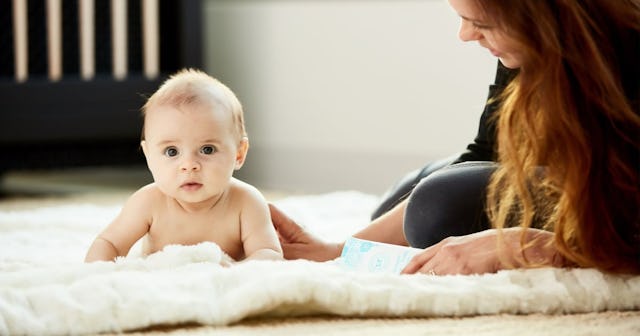Are Baby Hiccups Normal?

It’s a universal truth that every single thing a newborn does falls into one of two camps: cute and terrifying. No, scratch that, because it’s usually both camps. This tiny little treasure can make even the most mundane things seem precious enough to document and plaster all over your Instagram account — including baby hiccups. Once the initial heady rush of adorable baby newness wears off, though, newborn hiccups may leave you wondering if something is wrong with your child. Are baby hiccups even a normal thing? First, Mama, it’s totally OK! Hiccups in newborns and babies are almost always completely harmless and indicative of baby’s growth and development. They’re even normal in utero. Still, you’re probably curious why they happen and what you can do about them.
You’re not alone in that respect. In fact, according to the most recent search data available to Scary Mommy, the topic of hiccups in babies is searched for nearly 40,500 per month. So, here’s the scoop.
Check out more from our Baby & Toddler Development package to read more about thrush in babies, jaundice, why babies look bow legged, baby kneecaps, toddler flat feet, newborn eye color, and bone structure in babies.
Why do babies hiccup?
This is sort of a two-part question. The first part should be, “What are hiccups in babies?” The answer to that is much the same as hiccups in adults — they are the byproduct of the diaphragm spasming, causing the vocal cords to quickly shut. When that happens, air is forced out through the closed vocal cords, creating the signature hiccupping sound. Hiccups in both babies and adults are stimulated by the phrenic nerve, which is attached to the muscle of the diaphragm.
The second half of the two-part question, then, is why hiccups happen. And, well, the answer to that is a bit… murkier. In fact, there is no known verified purpose for hiccupping in babies (or adults, for that matter).
Are there theories about why babies get hiccups?
Not surprisingly, yes; there are myriad theories.
Newborns are particularly prolific hiccupers, spending up to 2.5 percent of their time in the newborn stage doing so. Accordingly, lots of ideas about hiccupping in babies center around their behavior. For example, many health professionals believe babies hiccup due to their eating habits. The logic here is that overfeeding, eating too fast, or swallowing a lot of air can cause the stomach to distend and push against the diaphragm.
Others blame reflux or regurgitated milk in the throat for irritating the esophagus in a way that leads to hiccups. And some theorize that prolonged bouts of crying can also lead to hiccups since they both irritate the esophagus and cause baby to gulp excess air.
Are hiccups bad for a newborn?
In general, hiccups are not a cause for concern. Stow your mommy brain’s red flags away for now (you’ll surely need them for something else soon enough). Hiccups in newborns and infants usually only last a few minutes and resolve on their own. They can even last for 10 minutes or longer and still be considered totally innocuous — especially if your little one acts unbothered.
There are always exceptions to the rule, of course. If you wait it out and your baby’s hiccups don’t go away after a reasonable amount of time, call your pediatrician to pinpoint a possible cause. Similarly, you should consult with a doctor if you notice your baby hiccups frequently and it leads to vomiting or distress. Your little one may be suffering from an underlying health condition like gastroesophageal reflux (GER).
How do you stop baby hiccups?
Here’s the thing about hiccups: They’re technically a reflexive action, like sneezing. So, we can’t really stop it from happening or control it. But there are a few things you can try to help relieve your baby of their cute but potentially annoying diaphragm spasms:
- Burping baby might help get rid of hiccups if excess gas is the culprit. If the problem persists over time, consider trying out a different baby bottle brand. Another hack for eliminating excess air is sitting baby upright for 20 to 30 minutes.
- Giving your little one a pacifier could help relax their diaphragm enough to kick the hiccups goodbye, too. And some parents are diehard believers in gripe water — a combination of herbs and water (best to ask your doctor first if you want to try this route).
- If you feel comfortable doing so, try giving your baby gripe water. Gripe water is a natural supplement made of herbs like ginger, fennel, or chamomile which help ease a baby’s discomfort caused by excess gas or air in the stomach.
But, bottom line? There is no hard-and-fast “cure” for hiccups in babies. You can’t have them drink upside down from a cup of water or put a spoonful of peanut butter in their mouth, two time-honored adult tricks. Unless baby’s hiccups seem like a legitimate cause for concern, you might just have to let the little buggers run their course.
Do babies hiccup in utero?
Let’s start at the start, shall we? If you think you’ve felt a rhythmic hiccup coming from inside your pregnant belly you are not wrong. That’s because babies’ lungs start maturing in the second and third trimester and, as such, hiccups are a natural development that typically subsides by weeks 30 to 32.
As always, if you feel something is amiss or the baby has bouts of hiccups several times a day, you should reach out to your obstetrician.
This article was originally published on